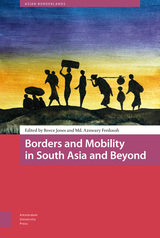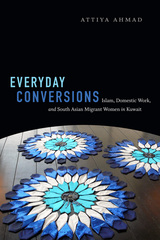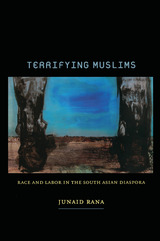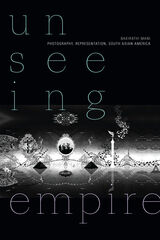5 books about South Asian diaspora

Archive of Tongues
An Intimate History of Brownness
Moon Charania
Duke University Press, 2023
In Archive of Tongues Moon Charania explores feminine dispossession and the brown diaspora through a reflection on the life of her mother. Drawing on her mother’s memories and stories of migration, violence, sexuality, queerness, domesticity, and the intimate economies of everyday life, Charania conceptualizes her mother’s tongue as an object of theory and an archive of brown intimate life. By presenting a mode of storytelling that is sensual and melancholic, piercing and sharp, Charania recovers otherwise silenced modes of brown mothers’ survival, disobedience, and meaning making that are often only lived out in invisible, intimate spaces, and too often disappear into them. In narrating her mother’s tongue as both metaphor for and material reservoir of other ways of knowing, Charania gestures to the afflictions, limits, and failures of feminist, queer, and postcolonial scholarly interrogations and the consequences of closing the archive of the brown mother.
[more]

Borders and Mobility in South Asia and Beyond
Edited by Reece Jones and Md. Azmeary Ferdoush
Amsterdam University Press, 2018
The world is experiencing one of the largest movements of people in history with 65 million people displaced by conflict in 2015, the majority of which were from Asia. This book brings a deep engagement with individuals whose lives are shaped by encounters with borders by telling the stories of a poor Bangladeshi women who regularly crosses the India border to visit family, of Muslims from India living in Gulf countries for work, and the harrowing journey of a young Afghan man as he sets off on foot to Germany. The international and interdisciplinary work in this book contributes to this moment by analyzing how borders are experienced by migrants and borderlanders in South Asia, how mobility and diaspora are engaged in literature and media, and how the lives of migrants are transformed during their journey to new homes in South Asia, the Middle East, North America, and Europe.
[more]

Everyday Conversions
Islam, Domestic Work, and South Asian Migrant Women in Kuwait
Attiya Ahmad
Duke University Press, 2017
Why are domestic workers converting to Islam in the Arabian Peninsula and Persian Gulf region? In Everyday Conversions Attiya Ahmad presents us with an original analysis of this phenomenon. Using extensive fieldwork conducted among South Asian migrant women in Kuwait, Ahmad argues domestic workers’ Muslim belonging emerges from their work in Kuwaiti households as they develop Islamic piety in relation—but not opposition—to their existing religious practices, family ties, and ethnic and national belonging. Their conversion is less a clean break from their preexisting lives than it is a refashioning in response to their everyday experiences. In examining the connections between migration, labor, gender, and Islam, Ahmad complicates conventional understandings of the dynamics of religious conversion and the feminization of transnational labor migration while proposing the concept of everyday conversion as a way to think more broadly about emergent forms of subjectivity, affinity, and belonging.
[more]

Terrifying Muslims
Race and Labor in the South Asian Diaspora
Junaid Rana
Duke University Press, 2011
Terrifying Muslims highlights how transnational working classes from Pakistan are produced, constructed, and represented in the context of American empire and the recent global War on Terror. Drawing on ethnographic research that compares Pakistan, the Middle East, and the United States before and after 9/11, Junaid Rana combines cultural and material analyses to chronicle the worldviews of Pakistani labor migrants as they become part of a larger global racial system. At the same time, he explains how these migrants’ mobility and opportunities are limited by colonial, postcolonial, and new imperial structures of control and domination. He argues that the contemporary South Asian labor diaspora builds on and replicates the global racial system consolidated during the period of colonial indenture. Rana maintains that a negative moral judgment attaches to migrants who enter the global labor pool through the informal economy. This taint of the illicit intensifies the post-9/11 Islamophobia that collapses varied religions, nationalities, and ethnicities into the threatening racial figure of “the Muslim.” It is in this context that the racialized Muslim is controlled by a process that beckons workers to enter the global economy, and stipulates when, where, and how laborers can migrate. The demonization of Muslim migrants in times of crisis, such as the War on Terror, is then used to justify arbitrary policing, deportation, and criminalization.
[more]

Unseeing Empire
Photography, Representation, South Asian America
Bakirathi Mani
Duke University Press, 2020
In Unseeing Empire Bakirathi Mani examines how empire continues to haunt South Asian American visual cultures. Weaving close readings of fine art together with archival research and ethnographic fieldwork at museums and galleries across South Asia and North America, Mani outlines the visual and affective relationships between South Asian diasporic artists, their photographic work, and their viewers. She notes that the desire for South Asian Americans to see visual representations of themselves is rooted in the use of photography as a form of colonial documentation and surveillance. She examines fine art photography by South Asian diasporic artists who employ aesthetic strategies such as duplication and alteration that run counter to viewers' demands for greater visibility. These works fail to deliver on viewers' desires to see themselves, producing instead feelings of alienation, estrangement, and loss. These feelings, Mani contends, allow viewers to question their own visibility as South Asian Americans in U.S. public culture and to reflect on their desires to be represented.
[more]
READERS
Browse our collection.
PUBLISHERS
See BiblioVault's publisher services.
STUDENT SERVICES
Files for college accessibility offices.
UChicago Accessibility Resources
home | accessibility | search | about | contact us
BiblioVault ® 2001 - 2024
The University of Chicago Press









